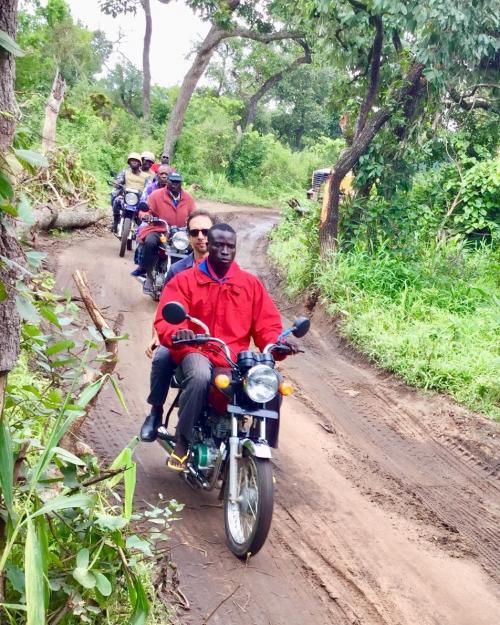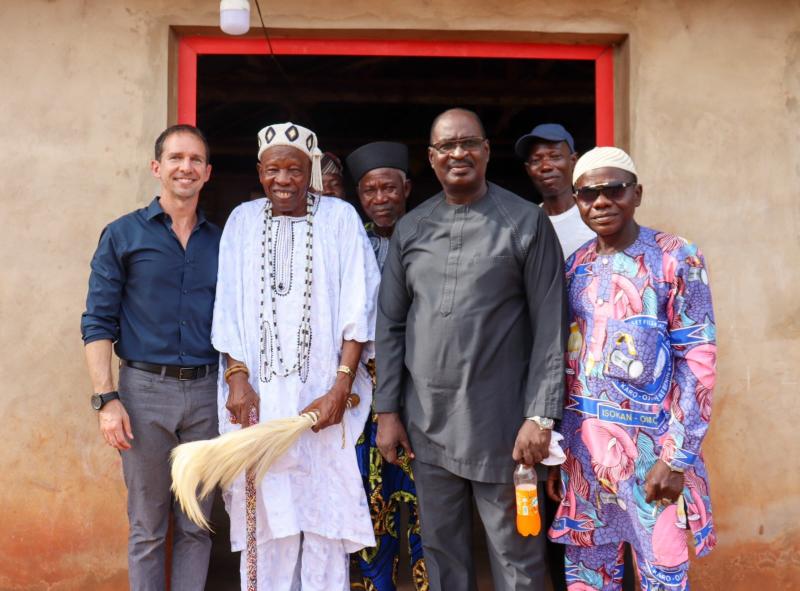GVPT Researcher is Tackling Terrorism with Togetherness
Building on earlier work in Benin, West Africa, Associate Professor John McCauley has been granted $4.2M to similarly reduce the threat of terrorism in northern Ghana
“Global patterns of terrorist attacks have been declining since 2016, but don't tell that to the people who live in Burkina Faso and Niger right now, or increasingly in places like northern Benin and northern Ghana, because in some parts of the region they're facing a terrorist attack every week,” says John McCauley, an associate professor in the University of Maryland Department of Government and Politics. “Terrorism is anything but getting better in this particular part of the world.”
With more than $4 million in support from the United States’ Agency for International Development, McCauley will lead the Center for International Development and Conflict Management’s (CIDCM) efforts to help the many ethnic, religious and other groups living in northern Ghana find common ground, and in turn, a common cause: Keeping al-Qaida in the Islamic Maghreb (AQIM), Jama'at Nusratul Islam wal Muslimin (JNIM) and Boko Haram terrorist groups out of the area.

“To the north of Ghana is Burkina Faso, and the southern part of Burkina Faso has essentially been abdicated to terrorist groups; there is no longer a government presence in the southeastern part of the country, which is just north of Benin,” explains McCauley. “Now the concerns are that these terrorist groups are starting to move down into the northern parts of other coastal countries like Ghana.”
McCauley brings years of expertise to the new, five-year project. Before graduate school, McCauley spent time in the area through the Peace Corps, and in 2018, he led a team helping to improve police-community relations in Benin through a grant awarded to the National Consortium for the Study of Terrorism and Responses to Terrorism (START), where McCauley is a research affiliate.
The Benin project, now in its second phase, takes a slightly different approach to preventing terrorism, chiefly by helping border police officers and community members recognize frustrations with the other, work through those frustrations, and increase the likelihood of someone in the community reporting suspicious activity they see to the police.
“In Benin, the borders are very, very porous, meaning that there are informal trafficking networks of people going back and forth on little mopeds trading gasoline, rice and goods like cigarettes. Terrorist group networks can capitalize on these same informal networks and routes,” says McCauley. “In Ghana, rather than working with police and the communities they serve, we'll be working with different identity groups within communities in northern Ghana.”
Though McCauley says that northern Ghana has enjoyed relative peace and stability, competition between farmers and herders over land and water resources, between mining groups over mine access, and other such conflicts has created a lot of tension—and opportunities for terrorist group involvement.
“You also have ethnic and religious identities that overlap with these occupational conflicts, and if terrorist groups see breakdowns in social cohesion in small villages and towns where they would like to establish a foothold, that's exactly what they can capitalize on,” notes McCauley. “If you think about the job opportunities that exist for young men and their frustration in not having many opportunities, and you couple that with the desire that all people have to belong to something, then you can see how easy it is for small terrorist cells to start recruiting.”

To strengthen the relationships between these groups, McCauley will bring together leaders from various organizations for community values workshops, 25-30 community members for simulation-based dialogues, and youths for civic education, engagement and athletics activities that instill in the next generation teamwork and cooperation.
Norsaac, a policy organization in Ghana, will help lead the youth-focused activities—including female empowerment workshops—and the West Africa Network for Peacebuilding (WANEP) in Ghana will help lead the more adult-focused workshops and dialogues. Researchers from Washington State University will provide project management support.
“Our goal can’t be to prevent terrorist attacks, because that's probably going to happen in one way or the other, but what our goal can be is to improve things like trust and collaboration across identity group lines,” says McCauley.
McCauley plans to travel to Ghana at the end of January to have kick-off meetings with the embassy, WANEP and Norsaac. He hopes to have with him a newly hired, UMD-affiliated in-country project manager, who will be paid to coordinate between the two local partners in person, and make sure that the project’s many activities are staying on track.
“I’m really excited to have somebody that will be out there working closely with WANEP and Norsaac so that we can have a regular presence; it's not often that we have the opportunity to have somebody based full-time on the ground, but the scope of this grant is such that we are able to do that,” says McCauley, who usually visits every two to three months. “This is a region where I have lots of friends, and it's a place where I've worked for a long time, so it's really meaningful to me to be working on this issue and reassuring to know that our government is taking this seriously as well.”
Photos of John McCauley with individuals in Benin are by Adam Chabi Bouko
Published on Thu, Dec 22, 2022 - 10:41AM



